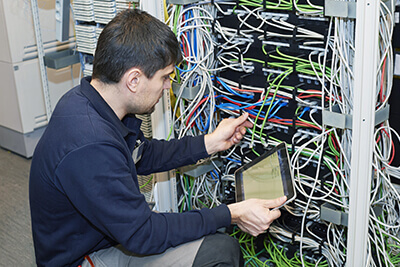 The Voice-Data-Video industry is another highly complex industry that is changing at a rate that has the industry trying to keep up with its every move. You can definitely classify it as a unique trade that requires a telecommunication journeyman to be highly skilled. The person entering this trade must have the aptitude to learn and be able to develop through training the knowledge, skills, and ability necessary to perform the tasks associated with the trade.
The Voice-Data-Video industry is another highly complex industry that is changing at a rate that has the industry trying to keep up with its every move. You can definitely classify it as a unique trade that requires a telecommunication journeyman to be highly skilled. The person entering this trade must have the aptitude to learn and be able to develop through training the knowledge, skills, and ability necessary to perform the tasks associated with the trade.
The Joint Apprenticeship And Training Committee is made up of labor and management partnering together to train those wishing to undertake such a challenge. The program is a two-part program work and school. During the day the apprentice will work on a job under construction, a commercial or industrial building that is occupied, or for a customer who may be upgrading his telecommunication/data system. Equipment rooms in buildings often contain hubs, routers, file servers or a telephone switch. The service you are working on may control a whole building and you may not interrupt service. You may also be called upon to string fiber optic cable on existing poles.
The program is a four-year program that trains an individual to become a highly seasoned skilled telecommunication worker.
The schooling consists of the following:
A. Safety:
Safety and Health Awareness courses, which include OSHA 10/30-hour, electrical safety, asbestos safety, hazard communication, first-aid, ladder safety, job safety and work zone safety courses.
B. Blueprints:
Blueprint reading and sketching
C. Mathematics:
Algebra, Geometry, Trigonometry, and Trade Math
D. Electrical Theory:
Electrical theory consists of Ohms Law, AC theory, DC theory, Electronic Components, Test Equipment, Digital Circuitry, and Transmission Fundamentals etc.
E. Trade Science:
Basic Tools and Equipment, National Electric Code, TIA/EIA Industry Standards, State And Local Codes, Grounding Electrode Systems, Install, Terminate and Test Wires and Cables Fiber/Copper, Security and Access Control Systems, Sound and Paging Systems, Installation of Routers, Hubs, Telephone Systems and Switches, BICSI Certification, CISCO (CCNA) Certification, Customer Relations etc.
F. Industrial and Labor Relations:
History of the IBEW and NECA, Labor History background and current laws and practices.
This is a brief overview of what the average Telecommunication apprentice will learn during his journey. Because this industry is ever-changing, by staying abreast of current and future emerging technologies we will have the best-trained workforce in the geographical area.